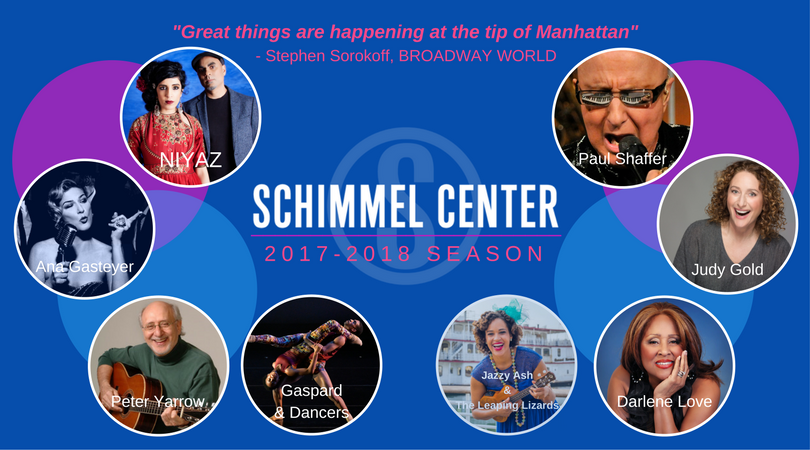Musicians of the Highest Order: An Interview with Colin Jacobsen, Artistic Director of “The Knights.”
All of us at the Schimmel are very excited to be welcoming Brooklyn’s most dynamic and exciting new Chamber Orchestra, The Knights. The group will be playing with special guest, Béla Fleck, the undisputed banjo master for one night only on Wednesday, January 28. I recently sat down to ask Colin Jacobsen, Artistic Director of The Knights, about this grand collaboration.
MT: Part of your group’s mission statement is to encourage musical discovery by honoring classical composition alongside contemporary works. Where does this idea stem from?
CJ: One of the great aspects of music is its ability to look, Janus-headed, in many different directions and at many different dimensions in the moment. When we are in the moment of performance, we are aware of the action we are doing and the sound we are making. But we are looking to the future as we spin out the sound-story and we are also reacting to what we just played a microsecond before. This allows us to be empathetic listeners as well as doers. I say this because, if you extend that thinking to the orchestral tradition, you see it constantly looking to the past in order to reinvigorate itself, so it’s only natural that we continue in that vein. Beethoven, Mozart and Haydn only really created their greatest works after they had rediscovered Handel and Bach. Debussy became fascinated with the music of Palestrina and Couperin, which helped to define his musical voice. The Knights, one and all, grew up with our instruments and the 400-ish year traditions we’ve inherited. So that’s the ground where we first encountered each other and one that is rich in cultural values that have been passed down, encoded in that music. But every generation needs to come to its own terms with the lessons of the past, and one way to become better interpreters of old music is to live and breathe new music. We strive to live the motto: play new music like it’s a familiar friend (yet full of surprises) and older music like it’s being heard for the first time.
MT: Do you feel that the eclectic musical landscape of New York lends to the essence of your mission?
CJ: Certainly- but that eclectic landscape is not limited to New York now. With the internet and the rate of change worldwide, most people are exposed to a wide variety of sounds. The challenge is how to embrace that diversity/eclecticism while chiseling out a unique voice.
MT: One does not usually think of the banjo and chamber music in the same context; has Béla Fleck been a great musical influence of yours?
CJ: It depends on how one defines chamber music – which I would take primarily to mean an elevated level of communication between a relatively small group of musicians. I’ve had the opportunity to see Béla with the “House Band” of the Telluride Bluegrass festival (people like Edgar Meyer, Sam Bush, Jerry Douglas, etc. who’ve played with each other in different combinations over many years), with African musicians and with Chick Corea and Marcus Roberts. All of those interactions fit my ideal of great chamber music, which involves serious radar and active listening so that the moment becomes fraught with possibility within whatever the frame is. It just so happens that in those collaborations the frame was bluegrass and jazz, whereas with The Knights, the framework is classical. And yes, Béla’s an inspiration in the way he keeps putting himself out there, doing new projects, challenging himself, his fellow musicians, and fans to take musical and personal risks.
MT: Compared to other instruments in the string family, the banjo has a rather short history. Does this concert make the argument that the Banjo has a place in the realm of classical music?
CJ: That may depend on how you define “history of the banjo.” If you go to its African roots (as Béla did on his Throw Down Your Heart project), it goes back much further. And in the early 20th century, Kurt Weill made extensive use of the banjo in his music (is his music classical? Don’t know, don’t care- it’s great). But I believe the question of whether an instrument has a place in any kind of music, if it isn’t commonly found there, is only limited by one’s imagination and courage. Basically, in music, anything can work! (Though often it doesn’t and there are all sorts of failed experiments). In the words of fashion guru Tim Gunn, “Make it work.” Béla does.
MT: How did this collaboration come about? How does this collaboration further your mission?
CJ: I romantically like to think there’s a gravitational pull that musicians have towards other like-minded musicians. Luckily for us, Béla wanted to tour his concerto and decided that we would be good partners. As for The Knights, every time we work with someone from the outside, there’s an opportunity for growth.
MT: You have developed a reputation for bringing music to the people by way of pop-up performances and internet videos. Is making music accessible in this way important to who you are as artists?
CJ: I’d like to think that there’s an element of positive deviancy within the spirit of The Knights. Taking your instruments out and simply playing something where it’s not expected is one way of transforming a space in a joyful way. A few years ago, a Knights violinist saw Harlem Shake go viral in its initial stage. We were about to go on tour, and he said, “It’s on- we’re doing the Harlem Shake.” I had no idea what he was talking about at the time, but I knew the answer was “Yes.” We want to reach people with our music where they are, so it may only be natural that we have some bits floating around in the web as well. (Should you happen to check out our Harlem video- it bears repeated viewing and a careful look at peoples’ costumes and what they’re doing. And then please do stop by our Beethoven video as well…)
MT: What would you like the audience to take away from this concert?
CJ: The Tragicomical Nature of Life.
MT: You are still a young group, yet you have already accomplished so much. Are you pleased with the repertoire that you have put out? Where would you like to see, “The Knights,” in the next few years?
CJ: We’re thrilled that today’s concert is the official release of our latest album, the ground beneath our feet – which is also the title of the piece co-created by several Knights that ends the program. This album looks at concerti grossi (pieces for 2 or more soloists in dialogue within the greater whole) from Bach to Stravinsky, with a piece by Reich and a collaboration with a Persian hammered dulcimer virtuoso. In general, recording is one great way to focus artistic thinking, and between this latest album, A Second of Silence (Schubert alongside Feldman, Glass and Satie), an all Beethoven album, and Shostakovich/Hendrix, you can get a greater sense of The Knights.
I think in the next few years, we’d like to keep seeking out fresh and interesting collaborators, create new work both externally and internally, continue to delve deep into the rich orchestral tradition, and find meaningful connections between that tradition, our lives and the world around us.
MT: Is there any particular repertoire that you would like to tackle in the future? Any future collaborators you would like to work with?
CJ: We may be working with a couple of excellent choruses in the near future. And we will be touring Europe with Dawn Upshaw. It’s always great to work with the human voice! Some other vocalists who would be amazing to work with? Hmm… how about Bjork, Mark Padmore, Miah Persson, Camilla Tilling, Esperanza Spalding, Caetano Veloso, Stevie Wonder, Sufjan Stevens. Some instrumentalists: Radu Lupu, Kristian Bezoutenhuidt, Chris Thile, Edgar Meyer…
For more on this incredible concert event, check back next week for an exciting interview with the banjo master himself, Béla Fleck.
See you at the Schimmel!
Michael Scott-Torbet
2014-15 Blogger
The Knights with Special Guest Star Béla Fleck; Wednesday, January 28; 7:30p; Tickets $59/ $49/ $39; call our box office at (212) 346-1715 or visit https://web.ovationtix.com/trs/pr/938584


